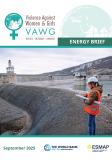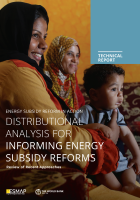Publications
This report aims to contribute to the global knowledge base on energy subsidy reform by exploring how poverty and distributional analyses have been used to support energy subsidy reform efforts. To this end, this report reviews select country-specific activities supported by the Energy Sector Management Assistance Program (ESMAP) and its Energy Subsidy Reform Facility (ESRF). The report begins by providing an overview of key distributional issues related to energy subsidy reforms and emerging lessons from a global stocktaking of practices, as well as country-specific insights from case studies. The report then discusses different approaches to the use of distributional analysis for gaining an understanding of the impacts of energy subsidy reforms in select country contexts, specifically in Guinea, Indonesia, Ukraine, and Uzbekistan.
Learn more about ESMAP's Energy Subsidy Reform Facility.
Olivier, Anne; Matytsin, Mikhail; Gencer, Defne.
Energy Subsidy in Action: Distributional Analysis for Informing Energy Subsidy Reforms - Review of Recent Approaches. ESMAP Technical Report. Washington, DC: World Bank Group.
https://openknowledge.worldbank.org/entities/publication/cb894829-90f3-42af-b2f1-33453f8ce106




